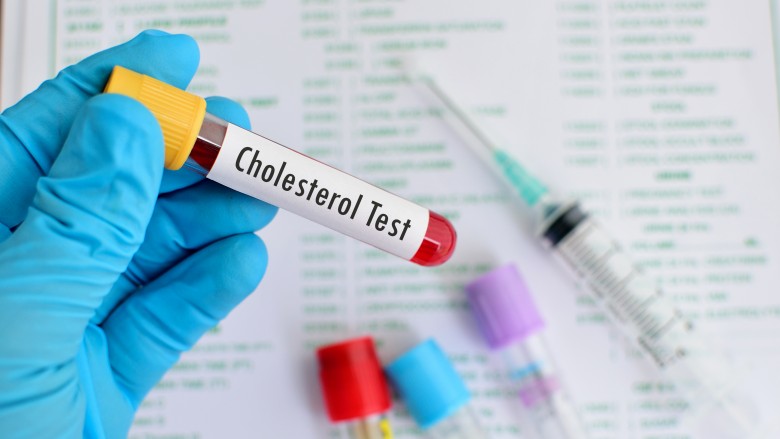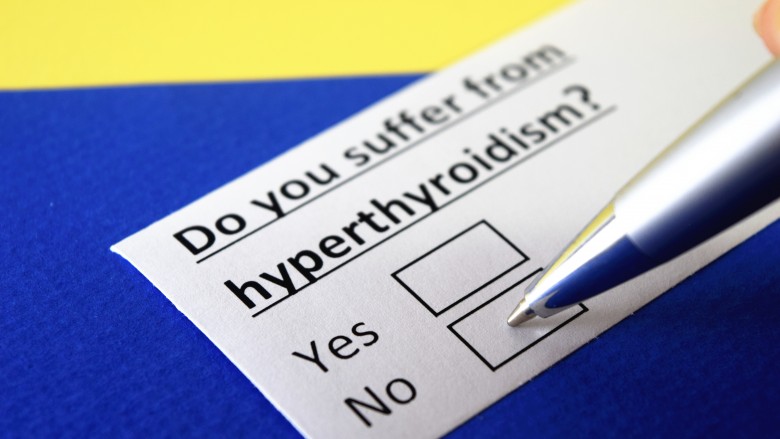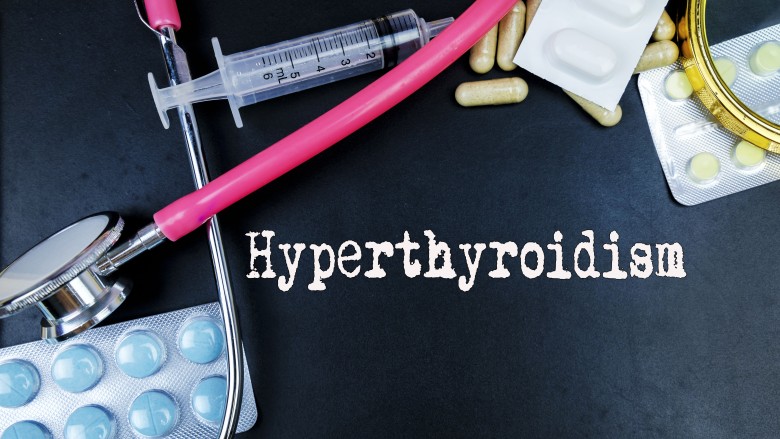Signs You Should Get Your Thyroid Checked
One tiny gland in your body that weighs under one ounce can put you into a world of hurt if it is not working correctly. That would be the thyroid gland. The Mayo Clinic notes that your thyroid "is located at the base of your neck, just below the Adam's apple." The gland contains hormones that regulate multiple functions in your body, including your metabolism, heart rate, and body temperature. So if it malfunctions, you can have a variety of health issues.
There are two basic ways your thyroid gland can go awry, according to EndocrineWeb.com: hyperthyroidism, in which the gland produces too much thyroid hormone, and hypothyroidism, in which it produces too little. These disorders can be caused by a variety of issues and are more common in women than in men, according to the U.S. Department of Health and Human Services.
Here are the symptoms you should watch out for that can show that the gland is overactive or underactive.
You have depression, memory issues, nervousness, or irritability
This is one of the most frustrating things about not being diagnosed with a thyroid issue. You may be depressed, have memory issues, or be annoyed or panicky all the time, and you think it's psychological instead of physical. Dr. Romy Block, a Chicago-area endocrinologist, told me that "mood changes (anxiety or depression)" can indicate that your thyroid is out of whack. The Mayo Clinic cites depression as a symptom of hypothyroidism, but it can also manifest in hyperthyroidism, as one counselor wrote in Psychology Today, and as a patient case study on the National Center for Biotechnology Information's website shows.
Other things to look out for include "nervousness, anxiety and irritability," which the Mayo Clinic says may be a sign of hyperthyroidism. And Dr. Block told me that "a common symptom of hypothyroidism is memory loss," so if you feel like you're being too forgetful these days, there might be a reason.
Your personal cholesterol levels are up
One of the reasons people don't always know that they should ask to get their thyroid checked is the fact that so many of the symptoms can also indicate some other issue besides too-high or too-low thyroid hormonal levels. You don't think of a high cholesterol level as indicative of a thyroid problem, but it can be. The Mayo Clinic says to watch out for an "elevated blood cholesterol level" as a symptom of hypothyroidism. The American Thyroid Association explains why this is. "When thyroid hormone levels are low and TSH levels are increased (hypothyroidism), cholesterol levels are increased," the organization says. So treatment for the condition may also help to lower cholesterol levels.
Your weight suddenly changes, or you're always hungry
Dr. Block told me that "most people recognize weight changes as the primary symptom of thyroid problems," although the endocrinologist said "it is often not the first sign to appear." That's because the thyroid regulates our metabolism, so if that goes awry, so can our weight.
The Mayo Clinic lists "sudden weight loss, even when your appetite and the amount and type of food you eat remain the same or even increase" as a primary symptom of hyperthyroidism. And weight gain that people might attribute to other factors, such as getting older, may possibly be hypothyroidism.
You have gastrointestinal issues
If you have such issues, it may be assumed that something is wrong with your digestive system. But the thyroid may also cause gastrointestinal problems. Dr. Block told me that bowel changes are one of the symptoms of a malfunctioning thyroid. Specifically, the Mayo Clinic describes one of the symptoms of hyperthyroidism as "changes in bowel patterns, especially more frequent bowel movements," while constipation can be a symptom of hypothyroidism.
Women's health expert Carolyn Dean, MD, ND told me, "Slow metabolism leads to slow bowel movement."
You're tired all the time, or you can't sleep
Insomnia can have many causes. But if you're having a hard time sleeping, it could be hyperthyroidism, according to the Mayo Clinic. In addition, Dr. Block said, "I also find racing thoughts before bedtime often accompany hyperthyroidism." That is something that we might think is psychological, but it can have a physical cause.
Another symptom to watch out for is fatigue, which can be a symptom of both hyperthyroidism and hypothyroidism. Dr. Ehsan Ali, the physician known as the Beverly Hills Concierge Doctor, told me that fatigue is a big sign you should get your thyroid checked.
Your muscles or joints feel weak
Muscle weakness is another sign that could show that your thyroid is not working correctly. It can be a symptom of both hypothyroidism and hyperthyroidism. The Mayo Clinic also says that "muscle aches, tenderness, and stiffness" and "pain, stiffness, or swelling in your joints" may be signs of hypothyroidism.
If your muscles feel sluggish, Melanie Goldfarb, MD, MS, FACS, a California-based endocrine surgeon, told me that this could be a sign of hypothyroidism. She explained that "sluggishness (mental and physical)" could be a sign that "your thyroid isn't producing enough hormone."
You're more sensitive to cold or heat, or you sweat a lot
Since one of the things the thyroid does is regulate body temperature, if it is malfunctioning, you may notice it with how you feel when it comes to the cold and heat. The Mayo Clinic cites both "sweating" and "increased sensitivity to heat" as symptoms of hyperthyroidism, while "increased sensitivity to cold" can be a sign of hypothyroidism.
Dr. Jason Cohen, a Los Angeles-based surgeon and expert in thyroid cancer treatment, told me that because "the thyroid maintains our homeostasis and keeps the body's energy levels in check," when it malfunctions, people may notice a difference in body temperature. When the "thyroid levels are low," he said, "people typically feel cold all the time," and when the levels are high, people may be "feeling hot or sweating." So what women of a certain age may think of as menopausal hot flashes may have another cause.
Your menstrual cycle is messed up
If you are having problems with your period, you may assume that you have issues with your reproductive system. But it could be your thyroid causing those issues, rather than your uterus, ovaries, or fallopian tubes. The Mayo Clinic lists "heavier than normal or irregular menstrual periods" as symptoms of hypothyroidism and "changes in menstrual patterns" as possibly indicating hyperthyroidism.
Dr. Ali told me you may want to get your thyroid checked if you are experiencing menstrual cycle changes, and Dr. Block said that "irregular periods can often represent a thyroid problem, either overactive or underactive."
Your hair is thinning or brittle, dry, and fine
Most of the doctors I spoke with mentioned to pay attention to the state of your hair, as it can provide a clue as to the health of the rest of your body. The Mayo Clinic says that "fine, brittle hair" can be a symptom of hyperthyroidism, and "thinning hair" can indicate hypothyroidism. Dr. Goldfarb explained that "when your thyroid isn't producing enough hormone," you may experience hair loss. Dr. Dean said that you may have dry hair as well with hypothyroidism. "Your hair doesn't grow as fast and your circulation is slowed down and doesn't nourish your hair," she explained.
You see changes in your face
A puffy face could be a sign of hypothyroidism, according to the Mayo Clinic. and thinning skin can be a sign not just of aging, but of hyperthyroidism. Dr. Ali also said that acne can be a sign that your thyroid is out of sync, specifically if your hormonal levels are low.
Your hands are trembling
People think of trembling hands as a sign of Parkinson's disease, as well as simple nervousness, but it can also be a sign of hyperthyroidism. The Mayo Clinic describes the hand tremors as "usually a fine trembling in your hands and fingers." When you have a tremor, you may literally find that your hands are shaking. And if the case of trembling is severe, the National Institute of Neurological Disorders and Stroke says that you might have "difficulty writing or drawing" as well as "problems holding and controlling utensils." You might also find that the trembling gets worse during times of stress.
Your heart rate is changing, or you're feeling heart palpitations
If you are feeling weird sensations around your chest, neck, or throat, it could be heart palpitations, and they may be caused by your thyroid, not your heart itself. The Mayo Clinic describes a number of things connected with your heart rate that can really indicate hyperthyroidism, including "rapid heartbeat (tachycardia) — commonly more than 100 beats a minute," as well as "irregular heartbeat (arrhythmia) or pounding of your heart (palpitations)." Dr. Goldfarb explained: "When your thyroid is making too much hormone (hyperthyroid), you can experience racing heart" as well as "palpitations." On the other hand, a slower heart rate can indicate hypothyroidism, according to the Mayo Clinic.
Dr. Cohen said that "when thyroid levels are low, we are low" and "our hearts might beat slower." He added, "If thyroid levels are high, a person will show signs of overactivity," including a "racing heart."
You sound hoarse, or you have a lump in your throat
If your voice feels very hoarse, it can indicate that you've been talking too much, have a cold, or have an issue with your thyroid. The Mayo Clinic says it can be a sign of hypothyroidism. It can also indicate, according to EndocrineWeb, that a thyroid nodule is physically pressing on your throat, causing your voice to become hoarse.
If the front of your neck looks and feels swollen, as if you literally have a lump in your throat, it could be hyperthyroidism. The Mayo Clinic describes it as "an enlarged thyroid gland (goiter), which may appear as a swelling at the base of your neck." This is why if you go to the doctor for thyroid issues, he/she will physically feel and examine your thyroid to see if it is too big. Dr. Ali said to pay attention to any "neck swelling" you may experience.
Why having a correctly working thyroid matters
Since the thyroid regulates so much of our body, it is important to have it working correctly to have optimum health. Dr. Goldfarb told me that when it comes to your thyroid, some "mild thyroid conditions that are not treated for many years can affect your heart, bones, and other organ systems," but that there are also "very mild abnormalities" that "may go unnoticed and don't necessarily need to be treated." She stressed that "symptoms that are caused by very abnormal thyroid hormones can also affect things like your energy level and productivity, which impacts your general health."
In addition, "for women trying to get pregnant, having your thyroid hormones in normal range is important," the physician said.
How a doctor checks a thyroid
If you go to your physician about a thyroid issue, chances are they will physically examine your thyroid. But you will also need to get blood tests that break down your thyroid levels. Dr. Block explained to me the TSH (Thyroid-Stimulating Hormone) Test is what is used to diagnose thyroid issues. It measures these "signals from your pituitary to your thyroid," but she explained that the TSH levels are "the opposite of what people think." A high TSH level indicates hypothyroidism and a low level indicated hyperthyroidism.
She said that a "high TSH is seen in hypothyroidism because your brain is yelling at your thyroid to speed up," while a "low TSH is seen in hyperthyroidism because your pituitary is telling your thyroid to slow down or stop making thyroid hormone."
There are other thyroid tests that can be given to further determine what is going on with your thyroid. The Free T4 Test measures "one of the circulating blood levels of thyroid hormone," and Dr. Block said "it is helpful in both hyper and hypothyroidism." The Free T4 Test "is really only helpful in hyperthyroidism," Dr. Block said. "It can often be high when the free T4 is normal in Graves' [Disease]. It is another circulating hormone in the bloodstream." Then there are tests to measure thyroid antibodies. "Thyroids stimulating Immunoglobulin (TSI) is often seen in Graves' Disease," she said. "Thyroid peroxidase antibody (TPO) is often seen in hypothyroidism," she added, specifically with Hashimoto's disease. "We can see it in hyperthyroidism too," she said. "I think of it like a key that can turn your thyroid off or on." The thyroglobulin antibody "is mostly seen in hypothyroidism," she said.
How having hyperthyroidism changed my life
In early 2007, I found that I was tired all the time and felt very weak. My muscles seemed to get tired quickly; even just walking down the street from my car to my house seemed to wear me out. I also had tremors in my hands, I was hot all the time, even in winter, and my eyesight seemed to be fading.
I chalked some of it up to stress at work but I began to get really scared when even on days off from work, I was still so exhausted. So I went to my primary care physician to see what was going on. He ran a battery of tests, including blood work, on me, and discovered my thyroid numbers were way off, indicating an overactive thyroid.
My physician referred me to an endocrinologist, a doctor who is a specialist in thyroid issues. All it took was him taking literally one look at me, as well as feeling my thyroid nodules in my neck, to figure out that I appeared to have Graves' Disease, an autoimmune disease that causes hyperthyroidism. He also asked me about how I was feeling. I didn't have all of the symptoms of hyperthyroidism. For example, my hair didn't change, and my skin stayed the same. But I had enough of the symptoms to indicate that there was an issue.
The doctor ran more specialized blood work (TSI, T3 and T4 tests) that confirmed the diagnosis. The reason he could tell so quickly? My "stare," as he called it, that he noticed as soon as he met me. Without me even realizing it, my eyes were starting to get a protruded, heavy-lidded look to them, which is what is known as Graves' Ophthalmopathy. Remember how actor Marty Feldman and former First Lady Barbara Bush had that bug-eyed look? Both of them suffered from Graves' Disease as well, and the disease was causing my eyesight to get blurry. I worried my eyes would get even worse. And I worried that I would never get my energy back. It was a frightening time for me.
Getting my thyroid issues under control took a while
Even though I had a disorder that was supposed to speed up my metabolism, I had actually gained weight because I was too fatigued to do much of anything outside of going to work. It took about six frustrating months of my endocrinologist trying different thyroid medications to get me back to normal. I was at the point where I was considering radiation to "zap" the thyroid just to get some relief. Finally, we found a medication that worked. After several years of regularly monitoring my thyroid, I was able to get off the medication for good, and my Graves' Disease went into remission.
I consider myself one of the lucky ones, as other people have had to get their thyroid removed, and/or be on medication for the rest of their lives to get back to normal, while my time of suffering was fairly short.
I asked Dr. Block for this article about why I gained weight, and she confirmed she had "Graves' patients that gain weight (instead of losing weight)," and said that some of them were also "exhausted," the way I was. I'm glad to finally learn that I wasn't alone here.
Getting your thyroid checked can be a new beginning
If you have some of the symptoms listed, and you just don't feel right, you might want to talk to your physician about it and have your thyroid checked. If your thyroid is the issue, there are a variety of treatments out there that can potentially improve your health and quality of life. It does get better.


















